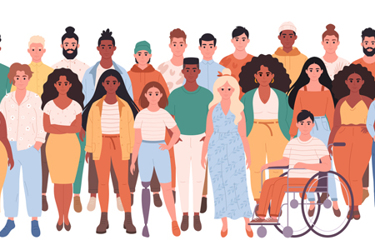
Emerging racial disparities among Medicare beneficiaries and Veterans with metastatic castration-sensitive prostate cancer
Guideline-recommended treatment intensification was low for all patients with metastatic castration-sensitive prostate cancer, with less TI in Black patients in both Medicare and the VHA. Black race was associated with worse OS in Medicare but not the VHA. Medicaid patients had less TI and worse OS than those without Medicaid, suggesting poverty and race are associated with care and outcomes.

$3.2 million grant aids in the study of genetic testing approach to close racial disparity gaps in cancer care
Genetic testing is a powerful tool used to identify a person’s risk for developing certain cancers that run in families. Identifying patients with a genetic alteration that increases susceptibility or predisposition to a certain disease is crucial to customize cancer treatment and guide primary and secondary prevention. However, there are low referral and genetic testing rates among racial minorities, especially among Blacks.

Tumor biology may underlie racial differences in certain breast cancer outcomes
“While socioeconomic factors are associated with adverse cancer outcomes and contribute to racial disparities, our research suggests that triple negative breast cancer (TNBC) tumors appear to respond differently to chemotherapy in women of different races and ethnicities and this may also contribute to the disparities,” said senior author Maggie DiNome, M.D., chief of the Section of Breast Surgery in the Department of Surgery at Duke University School of Medicine and member of the Duke Cancer institute.

AACR Cancer Disparities Progress Report 2024 Highlights Ongoing Health Inequities Experienced by Racial and Ethnic Minorities
Despite the extraordinary progress against cancer in the United States—illustrated by the continuing decline in the overall mortality rate, which fell by 33% between 1991 and 2020, and the increasing numbers of cancer survivors (over 18 million and climbing)—the burden of cancer remains disproportionately felt by racial and ethnic minority patients, according to the AACR Cancer Disparities Progress Report 2024, issued by the American Association for Cancer Research (AACR). The report cites the long history of racism, segregation, and discrimination against marginalized populations coupled with a lack of workforce diversity in cancer research and care delivery as contributing factors to health inequities experienced by certain segments of the United States population.

Two Straightforward Ways To Improve DE&I In Clinical Trials
There are over 434,000 clinical trials registered with Clinicaltrials.gov. However, data from the FDA indicate that 75% of trial participants in 2020 identified as white, while only 11% identified as Hispanic, 8% identified as Black or African American, and 6% identified as Asian


